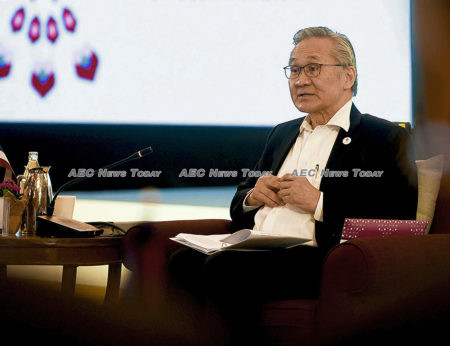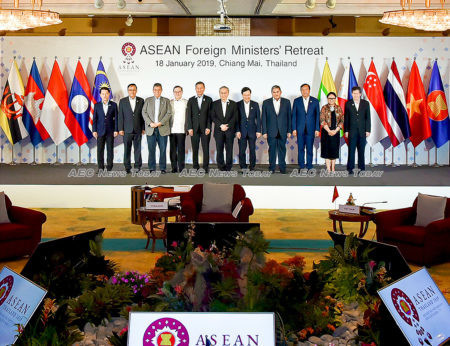Following a day of social immersion and the opportunity to sound each other out on issues with candid one-on-one talks and a working dinner, Asean’s foreign minister got down to work on Friday (Jan 18) with trade, humanity, and crime key items on the agenda.
Held under the theme of ‘Advancing Partnership for Sustainability’, a media statement issued by Don Pramudwinai, Thailand Minister of Foreign Affairs and Chairman of the 2019 Asean Foreign Ministers’ Retreat (AFMR) on Friday listed a string of topics raised over the two-day long event. (For details of geopolitical matters discussed see Hope for Rohingya: Asean foreign ministers put China, Myanmar on notice)
‘Fruitful discussions’ were held on prioritising the bloc’s policies and direction for the rest of the year, the statement said, with ‘community-building, the strengthening of Asean partnerships with external partners and the international community, and the reinforcing of the Asean-centred regional architecture’ at the core.
For Thailand the gathering was the first formal opportunity to flesh out details of its ‘Advancing Partnership for Sustainability’ theme.
With core pillars of building a people-centred Asean Community (AC) that leaves no one behind and a strong focus on sustainability, the statement said all present indicated their support of Thailand’s goals, recognising the strong need for additional sustainability measures (See: Thailand to lead Asean with creativity, complementarities and continuity (video)).
Stronger Russia, EU links

In the area of trade the group of 10 reportedly agreed on the need for enhanced efforts to bring negotiations of the long-awaited Regional Comprehensive Economic Partnership (RCEP) trade-deal to a conclusion this year. Additional efforts to see the Asean Single Window (ASW) trade document processing gateway become a reality were also acknowledged.
A report from the Asean Secretary-General on the potential political-security and socio-cultural effects of the Fourth Industrial Revolution on member states was acknowledged, along with one commissioned by Thailand from the Economic Research Institute for Asean and East Asia (ERIA) looking at Asean in 2040.
The meeting also agreed to further enhance Asean’s newly established Asean-Russia Strategic Partnership, and to upgrade Asean-EU relations to one of a Strategic Partnership. The ‘validity, relevance and importance of the Treaty of Amity and Cooperation (TAC) in Southeast Asia was also reaffirmed.
As expected, the need for narrowing development gaps within Asean received particular focus, as too did the need to ‘address long-standing issues that have affected AC building’.
Transnational crimes, cybersecurity, terrorim
Recognising the need for a comprehensive approach to transnational crimes brought about by enhanced regional connectivity, the meeting resolved to strengthening cooperation on border management, while facilitating cross-border trade and the movement of people.
The need for enhancing cybersecurity cooperation and the capacity of personnel skilled in cyber incidence response and analysis was also acknowledged, with the meeting noting the commencement of operation in Bangkok of the Asean-Japan Cybersecurity Capacity Building Centre (AJCCBC). Similarly the announcement of the Asean-Singapore Cybersecurity Centre of Excellence was also acknowledged.
Regional efforts to counter terrorism and violent extremism were also discussed, with Asean foreign ministers expressing their continued support for the ‘capacity-building programmes, joint research projects, and related events’ provided by the Southeast Asia Regional Centre for Counter-Terrorism (SEARCCT) in Kuala Lumpur, Malaysia.

Casting its eye onto regional connectivity, the statement said the meeting ‘recognised the importance and value of building on connectivity strategies at the sub-regional level and enhancing connectivity between Asean and other regions by connecting the connectivities’.
To this end, and to facilitate in the sharing of best practices, the promotion of Asean awareness, and a sense of the Asean Community and identity, a network of Asean associations of Asean member states was proposed, possibly signifying an enhanced role for the Asean Secretariat in Jakarta.
With the majority of foreign ministers already having returned home the work of making the goals and aspirations of the group begins. To this end there is an additional 75 Asean-related meetings scheduled before Thailand’s fourth period of Asean chair custodianship comes to an end.
See here for the full 2019 AFMR Chairs’ statement.
Feature video ASEAN2019TH
Feature photo Asean-Thailand Secretariat
Related:
- Solidarity should be among ASEAN’s core priorities: official (Vietnam+)
- Thailand hosts ASEAN Foreign Ministers’ Retreat (Xinhuanet)
- ASEAN cooperation to combat transnational crimes reaffirmed (Xinhuanet)
- Asean foreign ministers retreat in Chiang Mai (video) (AEC News Today)
- Behind the scenes at the 2019 Asean Foreign Ministers’ Retreat – Day 1 (gallery) (AEC News Today)
John Le Fevre
He has spent extensive periods of time working in Africa and throughout Southeast Asia, with stints in the Middle East, the USA, and England.
He has covered major world events including Operation Desert Shield/ Storm, the 1991 pillage in Zaire, the 1994 Rwanda genocide, the 1999 East Timor independence unrest, the 2004 Asian tsunami, and the 2009, 2010, and 2014 Bangkok political protests.
In 1995 he was a Walkley Award finalist, the highest awards in Australian journalism, for his coverage of the 1995 Zaire (now Democratic Republic of Congo) Ebola outbreak.
Prior to AEC News Today he was the deputy editor and Thailand and Greater Mekong Sub-region editor for The Establishment Post, predecessor of Asean Today.
In the mid-80s and early 90s he owned JLF Promotions, the largest above and below the line marketing and PR firm servicing the high-technology industry in Australia. It was sold in 1995.
Latest posts by John Le Fevre (see all)
- COVID-19 in Asean: update for July 26 — 16 mln case barrier breached, Vietnam records community transmission – July 26, 2020
- COVID-19 in Asean: update for July 25 — new high for daily infections, 16 mln infection barrier to break today – July 25, 2020
- COVID-19 in Asean: update for July 24 — Asean tops 230,000 cases, nudges 90,000 active – July 24, 2020
- Thailand morning news for July 24 – July 24, 2020

